
AASTMT provides diverse water management educational opportunities that align with the objectives of clean water and sanitation. These initiatives encompass educational programs, research projects, and collaborative efforts designed to promote sustainable water practices and advance water quality and resources management.
AASTMT Strengthens German Partnership to Advance Marine Sustainability and Water Research
The College of Maritime Transport and Technology at AASTMT welcomed a delegation from Freie Universität Berlin and Humboldt University under the DAAD-funded Ta’ziz Partnership program. The visit included tours of AASTMT’s Marine Environment and Climate Labs, focusing on water quality, air monitoring, and climate impacts on marine ecosystems — reinforcing AASTMT’s role in advancing SDG 6: Clean Water and Sanitation through international collaboration and sustainable research.
AASTMT Strengthens German Partnership to Advance Marine Sustainability and Water Research on AASTMT webpage
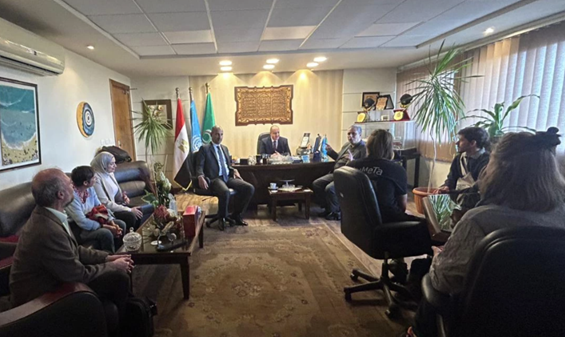
AASTMT Advances Sustainable Waste Management in Alexandria’s Hospitality Sector
From September 14–19, 2024, Beatrice Vanek and Omar Abdelrahman Abulheija from BlackForest Solutions GmbH, in collaboration with the AASTMT, conducted hands-on waste management training across 23 hotels in Alexandria under the TouMaLi Project (Prevention of Tourism Marine Litter). The training focused on waste segregation at source, introducing color-coded bins, distributing guidelines and posters, and engaging hotel staff—including housekeeping, maintenance, and management—in practical sessions to promote sustainable waste practices.
AASTMT Advances Sustainable Waste Management in Alexandria’s Hospitality Sector
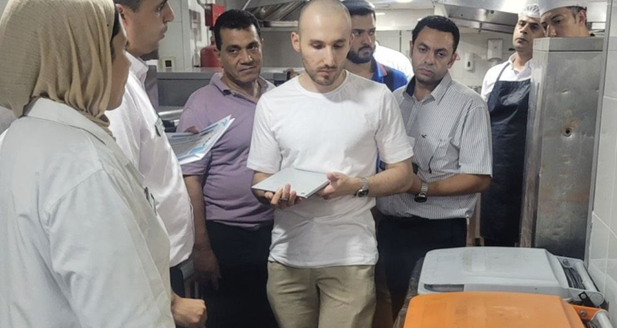
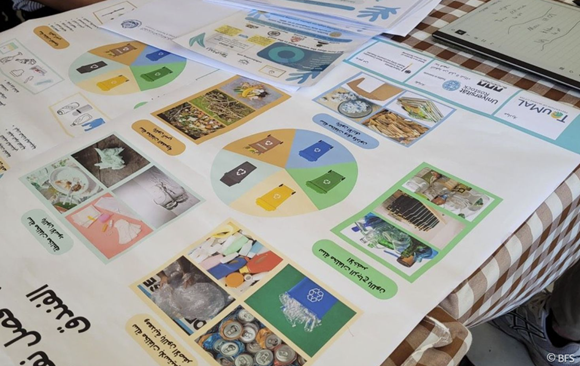
Promoting Water Efficiency and Resilient Agri-Food Systems through the RESILINK Project
As an active partner in the RESILINK Project, the AAST contributed to advancing water-efficient, climate-resilient, and sustainable agri-food systems in alignment with SDG 6: Clean Water and Sanitation. On May 16th, 2024, Prof. C. Pham delivered a keynote speech at the 1st Mediterranean Fruit Symposium: Hub for Innovation, highlighting the RESILINK project’s contribution to sustainable water and resource management in agri-food systems. The presentation emphasized how digital platforms and smart technologies—key elements of RESILINK—can enhance water efficiency, local innovation, and smallholder resilience, supporting SDG 6 (Clean Water and Sanitation) by promoting sustainable agricultural practices and optimized water use in the agro-food value chain.
On November 5th, 2024, Prof. Congduc Pham, coordinator of the RESILINK project from UPPA, delivered a keynote at the Smart Farming Workshop held during the IEEE EDiS 2024 International Conference on Embedded and Distributed Systems in Béchar, Algeria. His talk, titled “Transdisciplinary Research for Sustainable Development: Illustration with PRIMA INTEL-IRRIS and PRIMA RESILINK,” showcased how RESILINK integrates digital innovation, water-efficient technologies, and sustainable farming practices to address smallholder farmers’ needs. The presentation emphasized the project’s contribution to SDG 6 through optimized irrigation, resource-efficient systems, and sustainable agri-food solutions.
Promoting Water Efficiency and Resilient Agri-Food Systems through the RESILINK Project

AASTMT Leads Training Initiatives to Support Egypt’s Sustainable Waste Management and SDG 6
The AASTMT actively supports Egypt’s national program for an integrated solid waste management system, in partnership with the Ministry of Environment and the Ministry of Local Development. AASTMT contributed through training and technical capacity-building at the Sakkara Training Center, preparing engineers and local staff to operate sanitary landfills and manage waste recycling systems efficiently. These efforts help reduce pollution, protect water resources, and promote safe sanitation practices, directly advancing SDG 6 and Egypt Vision 2030.
AASTMT Leads Training Initiatives to Support Egypt’s Sustainable Waste Management and SDG 6 on AASTMT webpage

AASTMT Launches Professional Courses on Healthcare and Water Management Standards to Support SDG 6 & SDG 12
The AASTMT, in cooperation with the General Authority for Healthcare Accreditation and Regulation (GAHAR), has launched a new track of paid professional diploma programs designed to prepare qualified specialists in quality, sanitation, and water management within healthcare facilities. Through these courses, participants will receive comprehensive training that combines theory and practice in areas such as wastewater treatment, sanitation services, water quality monitoring, and pollution control. The programs are aligned with internationally accredited standards (ISQua/GAHAR 2021) and emphasize responsible consumption and production practices, ensuring more efficient use of water and sanitation resources. Graduates of the program earn a Professional Diploma from AASTMT, accredited by the Supreme Council of Universities, and may sit for the GAHAR certification exam to become an Egyptian Certified Accreditation Professional (EGYCAP). These certifications provide a pathway for professionals to work in hospital water management systems, sanitation departments, and quality control units, contributing directly to SDG 6 (Clean Water and Sanitation) and SDG 12 (Responsible Consumption and Production). This initiative reflects AASTMT’s commitment to expanding educational opportunities in water and sanitation management, while supporting Egypt’s Vision 2030 and strengthening national capacities in sustainable healthcare services.
AASTMT Launches Professional Courses on Healthcare and Water Management Standards to Support SDG 6 & SDG 12 on AASTMT webpage
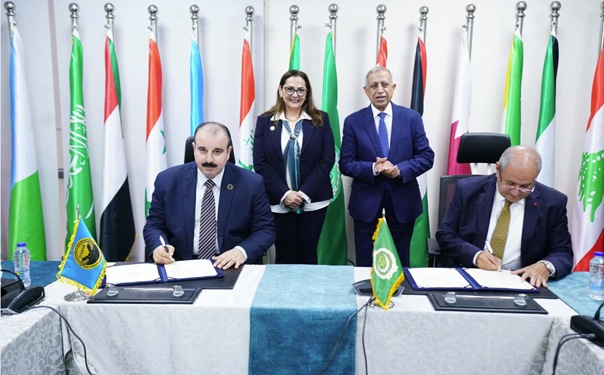
AASTMT, AOI, and UCLan Sign Cooperation Agreement to Advance Training, Technology Transfer, and Sustainable Industry
The AASTMT, the Arab Organization for Industrialization (AOI), and the University of Central Lancashire (UCLan), UK, signed a cooperation agreement to provide AOI engineers and technicians with advanced training programs in the UK, supported by the European Union.
The initiative contributes to several UN Sustainable Development Goals:
The cooperation also launched a joint training program to empower Egyptian graduates with skills in digital transformation, sustainable industry, and clean technology, while strengthening Egypt’s capacity to meet Vision 2030 targets. AASTMT President emphasized that the Academy, as a regional hub of expertise, is committed to developing Arab talent capable of leading innovation, promoting clean energy solutions, and ensuring sustainable resource management for the future.
AASTMT, AOI, and UCLan Sign Cooperation Agreement to Advance Training, Technology Transfer, and Sustainable Industry on AASTMT webpage
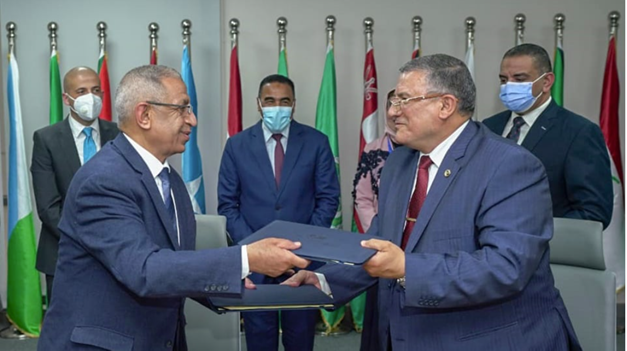
Post Graduate Master of Science Program in Water Resources Engineering
The Construction & Building department in AASTMT offers a paid MSc course in water resource engineering by equipping students with the technical knowledge and practical skills needed to manage and protect water resources sustainably. Through topics such as coastal project planning, wastewater network design, and hydraulic modeling, students learn to design efficient irrigation systems, prevent water pollution, and optimize freshwater usage. The course also emphasizes the importance of sustainable hydrological and coastal management, ensuring reliable access to clean water, improved sanitation systems, and the long-term resilience of aquatic ecosystems.
Post Graduate Master of Science Program in Water Resources Engineering on AASTMT webpage

Post Graduate Master of Science Degree in Sustainable Management of Fisheries and Aquaculture (SMFA), Funded by the EU (Erasmus+)
The Master of Science in Sustainable Management of Fisheries and Aquaculture (SMFA) is a joint program established through the FishAqu Erasmus+ Project, in collaboration with European universities (Aveiro, Palermo, Dubrovnik, and Euro-Mediterranean) and four Egyptian institutions including AASTMT. The program aims to enhance scientific research and develop sustainable practices in fisheries and aquaculture by linking academic research with real-world applications. It equips graduates with the knowledge and technical skills needed to manage aquatic resources efficiently, address water-related environmental challenges, and promote sustainable aquaculture practices. This program directly supports SDG 6 and SDG 14 through education, innovation, and international cooperation in sustainable water resource management.
Post Graduate Master of Science Degree in Sustainable Management of Fisheries and Aquaculture (SMFA), Funded by the EU (Erasmus+) on AASTMT webpage

Energy Management Service of AASTMT Productivity and Quality Institute (PQI) (Paid)
AASTMT PQI has a great role in supporting energy-efficient systems and offering paid courses that can significantly contribute to achieving SDG 6, Clean Water and Sanitation, particularly through quality control, safety management, and regulatory compliance, include:
Energy Management Service of AASTMT Productivity and Quality Institute (PQI) (Paid) on AASTMT webpage
Energy Management Service of AASTMT Productivity and Quality Institute (PQI) (Paid) on AASTMT webpage
Energy Management Service of AASTMT Productivity and Quality Institute (PQI) (Paid) on AASTMT webpage

Petrochemicals Environmental Crisis and Management
The Environment Protection and Crisis Management Center at AASTMT is a specialist training and research hub dedicated to advancing environmental protection, disaster preparedness, and sustainable development in the region. Equipped with state-of-the-art facilities—including a crisis-management simulator, an environmental analysis laboratory, an oil-spill training centre and a geospatial-information technology unit—the Center offers a wide array of professional and technical courses such as “Introduction to Environmental Disasters Management,” “Prevention and Combating Marine Pollution,” and “Oil Spill Crisis Management (IMO Level III)”. These programs enhance skills in environmental assessment, emergency response, contamination control and GIS analysis, thereby serving government agencies, industry professionals and academia in building capacity to confront water-and-environment-related challenges.
Environment Protection and Crisis Management Center on AASTMT webpage
Environment Protection and Crisis Management Center on AASTMT webpage
Natural Gas and Petrochemicals Simulator System Courses
The Natural Gas and Petrochemicals Simulator System in AASTMT offers a Ballast Water Operations Training course that directly supports SDG 6 by promoting responsible and sustainable water management in maritime operations. Through hands-on training on ballast water treatment systems, management plans, and international regulations, the course equips participants with the knowledge to prevent marine pollution, protect aquatic ecosystems from invasive species, and ensure safe disposal practices. This contributes to improving water quality and advancing global efforts toward sustainable and pollution-free marine environments.
Natural Gas and Petrochemicals Simulator System Courses on AASTMT webpage

Undergraduate Graduation Projects:
The AASTMT actively advances SDG 6 by supporting diverse student graduation projects that raise awareness on water and sanitation challenges. These initiatives provide students with a platform to explore vital issues such as water resource management, wastewater treatment, groundwater protection, desalination, and water pollution control. Through applied research and innovative solutions, the projects address both local and global water scarcity and quality concerns, reinforcing the university’s role in promoting sustainable water management and development.
Undergraduate Graduation Projects on AASTMT webpage
Undergraduate Graduation Projects on AASTMT webpage
Undergraduate Graduation Projects on AASTMT webpage

AAST Collaborative Workshop with Freie Universität Berlin on Meteorology (Free)
In accordance with the DAAD "Ta'ziz Partnership - Short-term Measures 2023," involving staff and student exchange, a collaborative workshop was organized between Freie Universität Berlin and the AASTMT in Alexandria, Egypt. The workshop, held from December 10-18, 2023, focused on environmental issues, particularly meteorology and water management for teaching students and staff. The workshop featured lectures on renewable and integrated methods of water treatment, crucial for ensuring sustainable access to clean water. The program included an in-depth exploration of groundwater quality in Alexandria. The participants learned about techniques for assessing and improving water quality, eliminating dumping, and minimizing hazardous chemical and material releases. Hands-on sessions included water sampling and analysis, offering practical experience in environmental management. These activities provided the participants with the skills needed to apply theoretical knowledge to real-world water management challenges.
https://aast.edu/en/news/news-details.php?language=1&unit_id=1&news_id=185161&event_type_id=1
https://aast.edu/en/news/news-details.php?language=1&unit_id=532&news_id=486101755&event_type_id=1

Unigreen Project Workshops (Free)
The UNIGREEN project, in collaboration with AASTMT and supported by European and regional partners, offers free educational opportunities aimed at raising awareness about SDG 6. Through workshops and training sessions, the project addresses key topics such as wastewater treatment, water resource management, and water pollution prevention. By integrating sustainable practices into learning modules, UNIGREEN helps participants understand the importance of water conservation and the use of modern technologies in irrigation and sanitation. This initiative empowers students and professionals to actively contribute to achieving sustainable water solutions. A group of participants in the UNIGREEN competition took part in a 6-day boot camp to develop innovative solutions to mitigate climate change. The camp focused on understanding climate issues, identifying target customers, refining business models, and testing assumptions for environmental sustainability. Funded by the European Union and led by Life Makers Foundation, AASTMT, and Nilepreneurs, the program partners include Samsung, Nile University, and the Egyptian Food Bank, offering participants guidance on creating eco-friendly business ventures.

Undergraduate Engineering Courses: (Paid)
These disciplines include specialized areas that align with sustainability goals, such as water management, sanitation, and resources management, providing students with the knowledge to address challenges like water scarcity, pollution, and wastewater treatment. More paid courses can be found on the following link:
https://lms.aast.edu/course/search.php?search=ECB4803

Master of Science Degree in Smart Environmental and Climate Change Management (SECCM): (Paid)
The program is designed to equip students with advanced knowledge and skills to manage environmental challenges, particularly those related to climate change and resource sustainability. Here’s how it aligns with SDG 6:
https://africa.marinetraining.org/node/5209
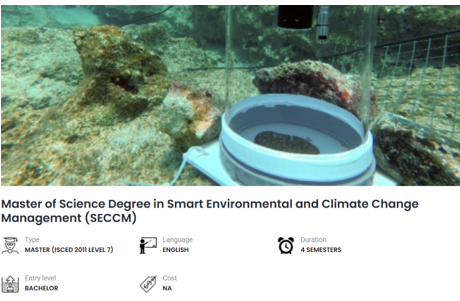
Vice President Dr. Alaa Abdel Bari visited the Alexandria Chamber of Commerce to meet with EU Ambassador Christian Berger and Chamber President Ahmed El Wakil. Engineering and pharmacy students participated in a two-day workshop on water awareness, held on May 14-15, 2023, to discuss water conservation and water security in the Mediterranean. The event emphasized utilizing EU grants and financial aid to support water projects, reflecting efforts toward achieving SDG 6.
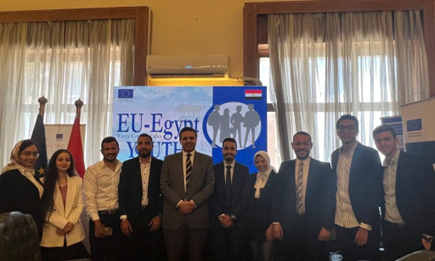
The visit to PICO Modern Agriculture by AAST students emphasized the company’s leading role in water management and its efficient use of water resources in irrigation. The company ensures the highest standards of water quality by using wastewater treatment technologies, sewage treatment, and maintaining a controlled water supply through irrigation scheduling. PICO also focuses on pollution prevention and ensures that effluents are managed properly, which helps prevent water contamination and supports water productivity. The visit demonstrated real-world applications of sanitation and water-saving measures in the agricultural sector.

Egypt-Texas Collaborative Workshop: Energy-Water Nexus (Free)
The workshop brings together experts from Egypt and Texas to explore critical intersections between energy and water systems, focusing on topics such as the Water-Energy-Food Nexus, governance policies, climate impacts, sustainability, and decarbonization strategies. It includes presentations by professors, researchers, and graduate students, fostering collaboration and discussion on future opportunities and research.
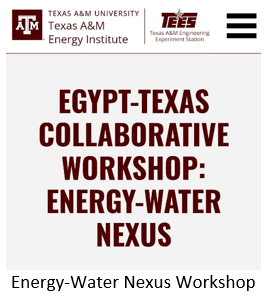
Energy Management Service of AASTMT Productivity and Quality Institute (PQI) (Paid)
AASTMT PQI has a great role in supporting energy-efficient systems and offering paid courses that can significantly contribute to achieving SDG 6, Clean Water and Sanitation, particularly through quality control, safety management, and regulatory compliance, include:For details of these courses, please visit the website:
https://aast.edu/en/institutes/pqi/contenttemp.php?page_id=3400199
The Productivity and Quality Institute in Alexandria continues to lead in specialized training in quality management and international standards. Recently, the institute organized a training course for employees in the laboratories of the Alexandria Drinking Water Company, focusing on ISO 17034:2023. This standard is vital for laboratories involved in preparing and distributing reference and certified materials. The course included practical exercises, real-life case studies, and comprehensive instruction on implementing the standard.
https://aast.edu/en/news/news-details.php?language=1&unit_id=34&news_id=486101414&event_type_id=1
The Productivity and Quality Institute – Alexandria conducted a "Environmental Impact Assessment" course for a group of employees from the Alexandria Drinking Water Company. The course, delivered by Dr. Abdel Fattah Mahmoud, an environmental systems consultant, covered topics on how to protect public health and the environment from the risks associated with activities and operations that could harm the environment. It emphasized finding suitable solutions to reduce pollution and preserve natural resources by incorporating environmental considerations during the planning, design, implementation, and operation of development projects.

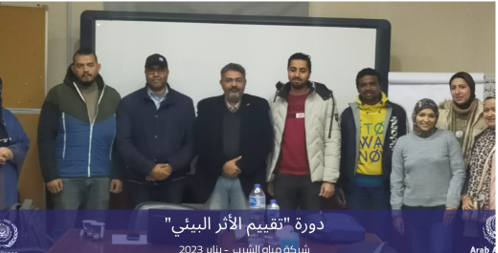
Graduation Projects: (Free)
The AASTMT actively supports SDG 6, by facilitating a wide array of student graduation projects aimed at increasing awareness about water and sanitation issues. These projects serve as a valuable platform for students to delve into critical aspects of water resource management, through research to address local and global water-related challenges, contributing to the university's commitment to fostering sustainable development.

AASTMT Hosts 2024 Arab Day for Disaster Risk Reduction, Focusing on Water Resources (Free)
The AASTMT hosted the 2024 Arab Day for Disaster Risk Reduction, led by President Dr. Ismail Abdel Ghaffar. The event, co-organized with the League of Arab States, addressed key topics like climate change, water resource management, and disaster response. Discussions included the impact of rising sea levels, water scarcity, and the role of technology in disaster mitigation, focusing on safeguarding water resources against climate threats in Arab countries.
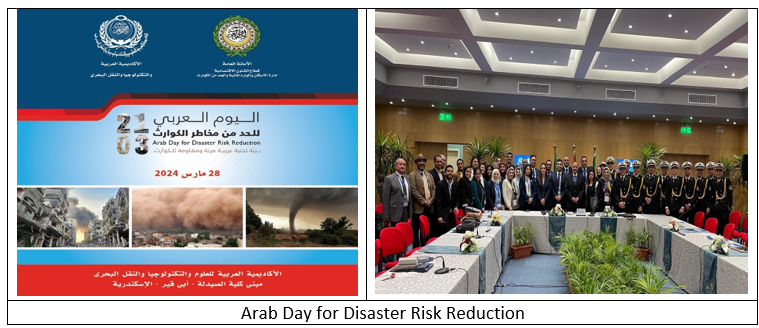
The Multidisciplinary Adaptive Climate Insights (MACI) journal, published by the Arab Academy for Science, Technology, and Maritime Transport (AASTMT), supports the broader goals of sustainable development, including SDG 6 (Clean Water and Sanitation), through its focus on the impacts of climate change on various sectors like water resources, agriculture, and the environment. The journal emphasizes interdisciplinary approaches to climate adaptation and mitigation strategies, which are crucial for managing water resources in the face of climate challenges.

The Enactus competition is a global social entrepreneurship program where student teams create projects that address social, economic, and environmental challenges. Teams present their innovative solutions, focusing on topics like sustainability, poverty, education, and climate change. These projects aim to make a positive impact on communities, aligning with the UN SDGs. Enactus AAST Sheraton is the Enactus team representing the AAST at Sheraton. They focus on creating entrepreneurial projects that address social and environmental challenges. Their projects, such as "Rose-Carbon" and "Aquatica," align with SDG 6 (Clean Water and Sanitation) by tackling water pollution through innovative activated carbon production and waste management solutions. These efforts contribute to improving water quality and reducing water contamination, showcasing the team's commitment to sustainability and problem-solving.

As part of the ongoing collaboration between AASTMT and the Armed Forces, engineering students from the South Valley branch visited the National Company for Land Reclamation in Toshka. The visit included an introduction to the company’s history and achievements, along with a tour of water lifting stations and modern irrigation techniques. Students were impressed by the opportunities available for water management and agricultural development, which aligns with SDG 6. The experience boosted their morale and pride in national achievements.

Students and faculty from AASTMT visited CEDARE to learn about its contributions to sustainable development, particularly in water resources management, which aligns with SDG 6. Dr. Khaled AbuZeid, Regional Director for Water Resources Management, discussed CEDARE's role in addressing regional water scarcity, managing water resources, and promoting sustainable practices to mitigate water pollution. The visit also included insights into the center's work on urban planning, smart transportation, and sustainable cities.

A committee from AASTMT, including Dr. Mustafa Abdel Jalil and Eng. Hiyam Ahmed, visited a school to explore opportunities for sustainable development with a focus on energy conservation. The school, known for its water conservation efforts, discussed methods to reduce water and electricity consumption in line with SDG 6 (Clean Water and Sanitation). They toured the school facilities, exchanged experiences, and engaged students in brainstorming innovative ways to conserve resources, alongside representatives from the Alexandria Water Company.
https://aast.edu/en/sdg/news-details.php?language=1&view=1&unit_id=1206&news_id=486101158&event_type_id=1

In support of SDG 6, AAST collaborated with the National Institute of Oceanography and Fisheries by providing training for its students on water resources and sustainable fisheries management. This collaboration helps improve water quality through better management of aquatic ecosystems, wastewater treatment, and water conservation. The partnership strengthens capacity-building in water resource management for students and professionals, addressing challenges related to water pollution and contributing to sustainable development in maritime and coastal areas.
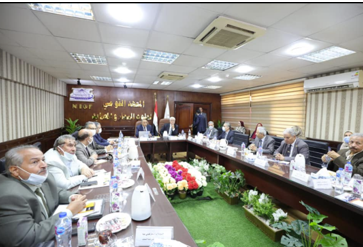
Free Workshops and Training Programs (2021-2022)
AASTMT offers free workshops and training programs for students, staff, employees and local community.
Read more information about the wokshops and training programs offered

The AASTMT actively supports SDG 6 by offering a range of master's degree programs designed to enhance awareness and understanding of water-related issues. These programs are meticulously crafted to educate and empower individuals to address the global water crisis, ensuring clean water and sanitation for all. Through multidisciplinary Water, Energy and Environmental Programs and courses and research initiatives, AASTMT equips its students with the knowledge and skills necessary to tackle challenges related to water resource management, sanitation, and sustainable water practices.
Read more information about educational programs and trainings offered

Paid AASTMT Energy & Environment Consultancy:
The Arab Academy for Science, Technology & Maritime Transport (AASTMT) offers pioneering Energy & Environment Consultancy programs designed to address pressing global challenges while aligning with Sustainable Development Goal 6 (SDG 6) - Clean Water and Sanitation. These programs integrate multidisciplinary approaches, equipping students with expertise in sustainable energy solutions, environmental conservation, and water resource management. Through innovative research and practical training, AASTMT's initiatives aim to foster a new generation of professionals capable of implementing strategies that promote access to clean water and sustainable sanitation, essential components of SDG 6.
Read more about the energy ad environment consultancy programs

The AASTMT actively supports SDG 6, by facilitating a wide array of student graduation projects aimed at increasing awareness about water and sanitation issues. These projects serve as a valuable platform for students to delve into critical aspects of water resource management, through research to address local and global water-related challenges, contributing to the university's commitment to fostering sustainable development.
Read more about the water related student's graduation projects
